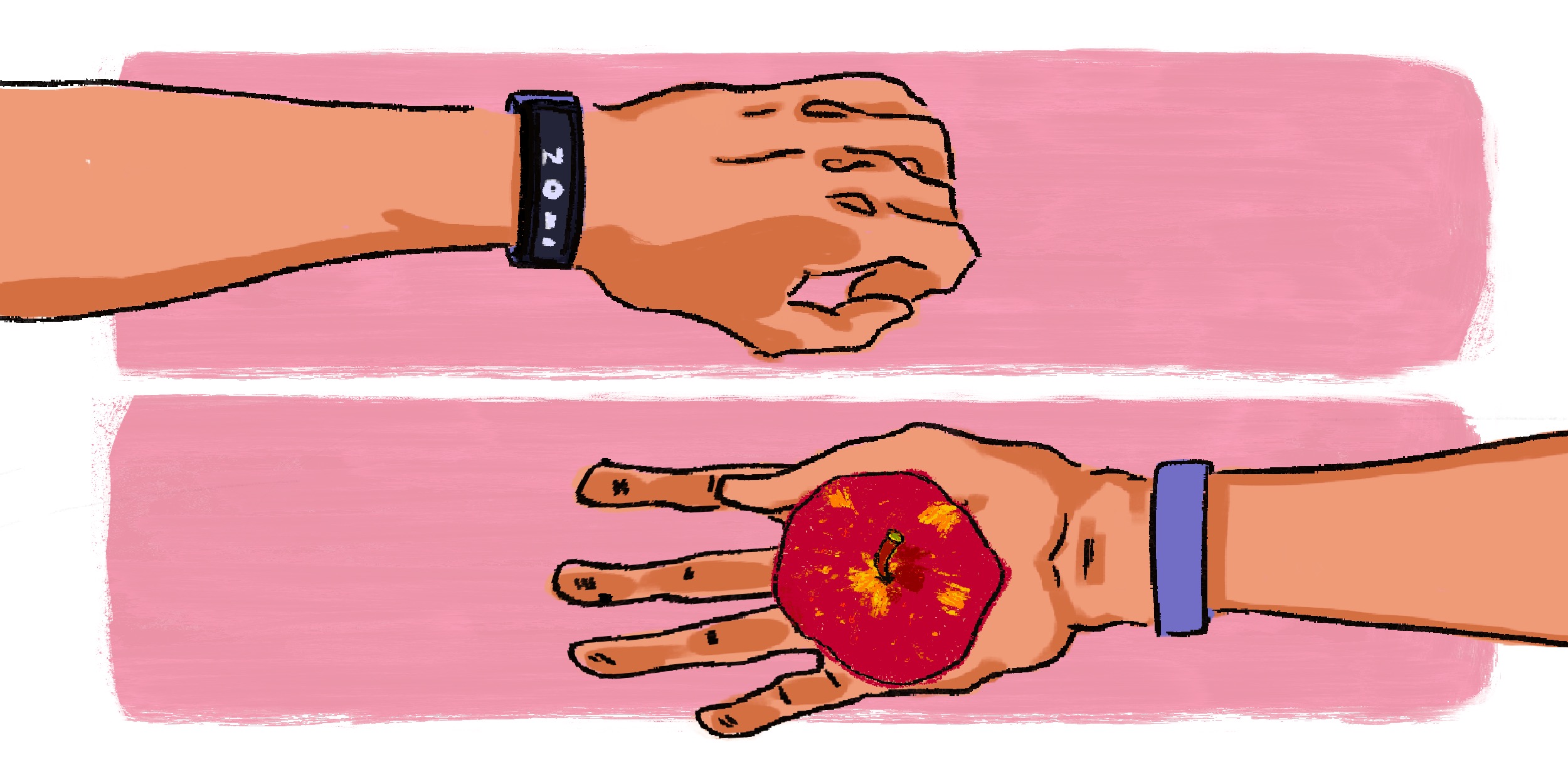A Diet By Any Other Name

Design by Nicole Nobre
What do you think of when you hear the word ‘diet’? While the term might have once evoked images of young women stocking up on Lean Cuisines, obsessing over their weight in pursuit of an unattainable societal ideal, a new paradigm is slowly transforming the way we think about dieting.
Dieting, as it has traditionally been defined, has fallen out of fashion. Dieting is seen as a vain, decidedly feminine pursuit, one that is incompatible with our modern, liberated, politically aware Gen Z culture. We are progressive now; we live in a body positive, postfeminist society! We know better than to deprive our bodies for weight loss. Instead, we deprive our bodies in order to combat aging, or to slow time down. It isn’t dieting, it’s biohacking — we are merely trying to optimize ourselves. It just so happens that the optimized body conforms exactly to the mainstream cultural thin ideal.
You know what they say: if it looks like a diet and smells like a diet…
But what’s really at stake when we talk about dieting? Why is it so important for feminists to combat diet culture?
There’s the fight against fatphobia, for one. Most diets, even those that are meant to prioritize ‘health,’ celebrate weight loss — if not as a primary goal, then as an auxiliary benefit. Positioning weight loss as an unconditional good further stigmatizes fat bodies and perpetuates fatphobic oppression, which disproportionately harms marginalized communities of color. Challenging the cultural imperative to diet is essential not only to confront fatphobia but to dismantle the racist and classist structures inextricably tied to fatphobia.
But a troubling new narrative has also emerged, one that is centered around efficiency and optimization. Food and exercise interventions are presented as ways to fine-tune our bodies in order to unlock their full potential. Health has become an algorithm — a careful set of calculations. We adopt increasingly invasive technologies so as not to waste any time in this pursuit of perfection. Perhaps we own a device that logs our every step, calorie and heartbeat. The most diligent among us can track our daily water intake with a Bluetooth-enabled smart water bottle. We might even send a company a bag of our own shit in order to receive a personalized nutrition plan.
The underlying mindset that we need to ‘hack’ our bodies presents natural bodily functions as obstacles to be overcome. Hunger, fatigue and illness become nothing more than pesky barriers to productivity. This logic of optimization, combined with the constant self-surveillance made possible by countless apps and trackers, alienates us from our own bodies and teaches us to ignore our internal cues.
Such rhetoric is not entirely new. Capitalist ideology that prizes profit and efficiency above all else has for centuries subjected workers to grueling conditions. The 40-hour work week forcefully separates workers from their bodily cues as their meals, sleeping schedules and even bathroom breaks are strictly regulated to maximize productivity.
What is new, however, is the seamless integration of modern ‘health’ technologies like Fitbit into the capitalist machine. Private and public employers alike are pushing their employees to wear trackers, using reduced healthcare premiums or reimbursement for deductibles as incentives. Go365, one such “employee wellness program,” reports on its website that its members had significantly fewer “unhealthy days,” defined as “days when employees are absent or, if physically present, not working at full performance.” These modern programs merely make explicit what capitalist doctrine has long implied: any minute not spent creating profit is a minute wasted.
But if these employee programs represent the violence of capitalism, why do we willingly continue to subject ourselves to that very same violence outside of the workplace?
Perhaps our obsession with dieting reflects a basic desire for control in a society that affords us so little. When we are repeatedly robbed of our autonomy by an unjust and exploitative world, it may feel comforting that we can, to varying degrees, control what we eat. Underlying this notion is a distinctly Westernized, masculine vision of conquest. If we can achieve mastery of the body, after all, what else might we conquer?
That we view the body as something to be conquered or controlled already presumes a split between body and mind — a sort of mind-body dualism that itself carries a gendered legacy. Women have historically been relegated to the body, while men inhabit the realm of rational thought. When Rob Rhinehart, founder of the meal-replacement brand Soylent, refers to his own body as a burden (“I would rather enjoy things because I want to, not because I have to,” he explains), he calls upon a longstanding Cartesian tradition that locates the self entirely in the mind and privileges male rationality over female embodiment.
Maybe contemporary diet culture is the latest expression of a centuries-old puritanical mindset that casts pleasure as sinful. Eating is an undeniably sensual experience intimately tied to family and community, but under the austere logic of capitalism it becomes but a means to an end. If our bodies are machines, food is the fuel — no enjoyment necessary. We fetishize self-denial and glorify dieting because it is synonymous with discipline and restraint.
Resisting the siren call of dieting requires questioning all of these interlocking belief systems: the ruthless efficiency of neoliberal capitalism; the pathologizing discourses of medical fatphobia; our cultural aversion to unapologetic pleasure. The fight against diet culture requires that we assert our right to take up space, and to declare loudly that our bodies do not exist to be productive. We deserve pleasure, leisure and autonomy; our bodies deserve respect.




